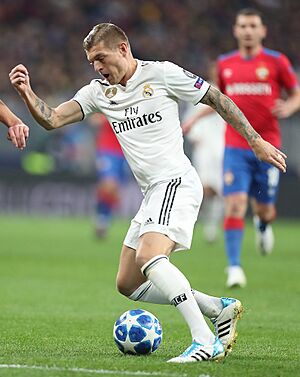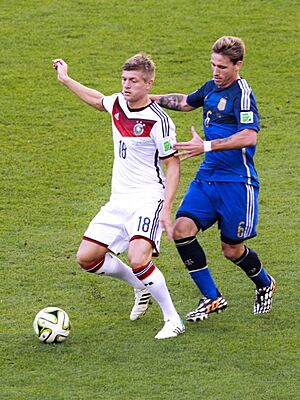Toni Kroos facts for kids

Kroos in 2021
|
|||||||||||||||||||||||||||||||
| Personal information | |||||||||||||||||||||||||||||||
|---|---|---|---|---|---|---|---|---|---|---|---|---|---|---|---|---|---|---|---|---|---|---|---|---|---|---|---|---|---|---|---|
| Full name | Toni Kroos | ||||||||||||||||||||||||||||||
| Date of birth | 4 January 1990 | ||||||||||||||||||||||||||||||
| Place of birth | Greifswald, East Germany | ||||||||||||||||||||||||||||||
| Height | 1.83 m (6 ft 0 in) | ||||||||||||||||||||||||||||||
| Position(s) | Midfielder | ||||||||||||||||||||||||||||||
| Youth career | |||||||||||||||||||||||||||||||
| 1997–2002 | Greifswalder SC | ||||||||||||||||||||||||||||||
| 2002–2006 | Hansa Rostock | ||||||||||||||||||||||||||||||
| 2006–2007 | Bayern Munich | ||||||||||||||||||||||||||||||
| Senior career* | |||||||||||||||||||||||||||||||
| Years | Team | Apps | (Gls) | ||||||||||||||||||||||||||||
| 2007–2008 | Bayern Munich II | 13 | (4) | ||||||||||||||||||||||||||||
| 2007–2014 | Bayern Munich | 130 | (13) | ||||||||||||||||||||||||||||
| 2009–2010 | → Bayer Leverkusen (loan) | 43 | (10) | ||||||||||||||||||||||||||||
| 2014–2024 | Real Madrid | 306 | (22) | ||||||||||||||||||||||||||||
| Total | 492 | (49) | |||||||||||||||||||||||||||||
| International career | |||||||||||||||||||||||||||||||
| 2005–2007 | Germany U17 | 34 | (17) | ||||||||||||||||||||||||||||
| 2009 | Germany U19 | 5 | (3) | ||||||||||||||||||||||||||||
| 2008–2009 | Germany U21 | 10 | (2) | ||||||||||||||||||||||||||||
| 2010–2024 | Germany | 114 | (17) | ||||||||||||||||||||||||||||
|
Medal record
|
|||||||||||||||||||||||||||||||
| *Club domestic league appearances and goals | |||||||||||||||||||||||||||||||
Toni Kroos (born 4 January 1990) is a German former professional footballer. He played as a midfielder. Many people think he is one of the best midfielders ever. He was known for his amazing vision and very accurate passes. Kroos mostly played as a central midfielder. Sometimes, he also played as a defensive midfielder.
Toni Kroos is one of the most successful German football players. He won 34 trophies during his 17-year career. He shares this record with Thomas Müller.
Kroos started his senior club career at Bayern Munich in 2007 when he was 17. He didn't play much at first. So, he went on loan to another German team, Bayer Leverkusen, for 18 months. There, he became a very important player. He returned to Bayern in 2010. With Bayern, Kroos won three German league titles (Bundesliga). He also won a UEFA Champions League and two German Cup trophies (DFB-Pokal). He was named in the Bundesliga Team of the Season three times. In 2014, he moved to Real Madrid.
At Real Madrid, Kroos won 22 trophies. These included four Spanish league titles (La Liga) and five UEFA Champions League trophies. Three of his Champions League wins were in a row, from 2016 to 2018. He was chosen for the Champions League team of the season each time. He was also named in the FIFA FIFPRO World 11 four times. He was in the UEFA Team of the Year three times and the La Liga Team of the Season twice. In 2014, he was named the IFFHS World's Best Playmaker. He was also the German Footballer of the Year in 2018 and 2024.
Kroos won the Golden Player award at the 2006 UEFA European Under-17 Championship. He also won the Golden Ball at the 2007 FIFA U-17 World Cup. He first played for the senior Germany team in 2010, when he was 20. He played in seven big tournaments. With 114 international matches, Kroos is one of Germany's top ten most-capped players. Kroos helped Germany win the 2014 FIFA World Cup. He was the top assister in that tournament. He was also named in the All-Star Team and Dream Team. At UEFA Euro 2016, he was named in the Team of the Tournament. Kroos retired from professional football in 2024.
Contents
Early Life and Youth Career
Kroos was born in Greifswald, East Germany, on January 4, 1990. This was just before Germany became one country again. His mother, Britta, was a national badminton champion. His father, Roland, was also a footballer. At the time, his father managed the youth team for Hansa Rostock. Toni has a younger brother, Felix Kroos, who also became a professional footballer. When he was young, Toni spent a lot of time practicing football. He was a good student and well-liked by his classmates.
Kroos started playing football at his local club, Greifswalder SC. Later, he joined the youth team of Hansa Rostock. In 2006, Kroos moved to Bayern Munich's youth academy. He sometimes missed up to 40 days of school each year because of his training.
Club Career Highlights
Starting at Bayern Munich
For the 2007–08 season, at age 17, Kroos joined Bayern's main team. He had an amazing start in the Bundesliga. He played his first game for Bayern on September 26, 2007. It was a 5–0 win against Energie Cottbus. He helped Miroslav Klose score two goals within 18 minutes of coming into the game.
When he first played, Kroos was the youngest player ever for Bayern in a professional match. This record was later broken by David Alaba in 2010. On October 25, Kroos helped Bayern win against Red Star Belgrade in his UEFA Cup debut. He came on as a substitute and assisted a goal for Miroslav Klose. Then, he scored the winning goal himself, which was his first for the club. He played 20 games for Bayern in his first season. He also scored three goals in 12 games for Bayern Munich II.
Even though he started Bayern's first game of the 2008–09 Bundesliga season, Kroos didn't play as much in the first half of the 2008–09 season. However, on November 5, 2008, he played his first UEFA Champions League game.
Loan to Bayer Leverkusen
On January 31, 2009, Bayern let Kroos join Bayer Leverkusen. This was an 18-month loan so he could get more experience playing in the first team. He played his first game for Leverkusen on February 28. He scored his first Bundesliga goal for Leverkusen on April 18, 2009. He also played in the 2009 DFB-Pokal Final, where Leverkusen lost 1–0. In the 2008–09 season, Kroos played 13 games for Leverkusen and scored one goal.
Kroos became a regular player for Leverkusen in the 2009–10 season. He played in almost all of their Bundesliga matches. Between December 2009 and January 2010, he scored five goals and made four assists in five Bundesliga games. This earned him "player of the month" awards. He finished the season with nine goals and 12 assists in 33 matches.
Return to Bayern Munich
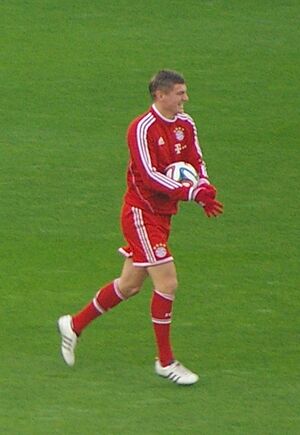
In the summer of 2010, Kroos returned to Bayern Munich after his loan ended. He wanted to play as much as possible for Bayern. On August 16, 2010, he started a German Cup game and scored a goal in a 4–0 win. On October 29, 2010, he scored his first league goal for Bayern. During the 2010–11 season, Kroos was a regular starter for Bayern. He played 37 games in total.
In the 2011–12 season, Kroos became a key player for Bayern. He played 51 games and was part of the team that reached the 2012 UEFA Champions League Final. Bayern lost that final to Chelsea in a penalty shootout.
Kroos was a very important part of Bayern's team that won three major trophies in the 2012–13 season. He scored three goals in the first four Bundesliga matches. He also scored his first Champions League goal for Bayern. However, he got injured in a Champions League game against Juventus. This meant he missed the rest of the season. He missed Bayern winning the 2013 UEFA Champions League Final, the 2013 DFB-Pokal Final, and the last seven league games.
Kroos was fit again for the start of the 2013–14 season. He played in the German Super Cup and the UEFA Super Cup. On October 4, 2013, he scored his first goal of the season against his old club, Bayer Leverkusen. He also played in the 2013 FIFA Club World Cup, which Bayern won. On February 19, 2014, Kroos scored in a Champions League win against Arsenal. On March 25, he scored in a win against Hertha BSC, which confirmed Bayern as Bundesliga champions.
Joining Real Madrid
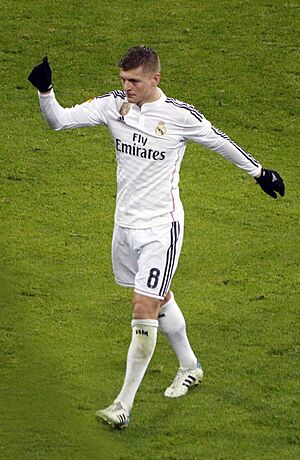
Before joining Real Madrid, Kroos had almost joined Manchester United. But after their manager changed, the deal didn't happen. Then, he got a call from Carlo Ancelotti, the Real Madrid coach.
On July 17, 2014, the Spanish club Real Madrid announced they had signed Kroos. He signed a six-year deal. The transfer fee was reported to be between €24 and €30 million. Kroos became the ninth German player to join Real Madrid. At his presentation, he said Real Madrid was the "biggest club in the world." He played his first game for Real Madrid on August 12, 2014, in the 2014 UEFA Super Cup. He won his first trophy with Real Madrid in that game.
He was part of a strong midfield with James Rodríguez and Luka Modrić. This midfield helped Real Madrid win 22 games in a row. On November 8, Kroos scored his first goal for Real Madrid. In December, he helped the team win the 2014 FIFA Club World Cup. He was named to the FIFA FIFPRO World 11 and the UEFA Team of the Year.
Continued Success and European Dominance
In 2015, Zinedine Zidane became Real Madrid's coach. Under Zidane, Kroos continued to be a key midfielder. Zidane said Kroos was "perfect for Madrid." Kroos was a regular starter when the team won the 2015–16 Champions League. This was his second Champions League trophy. He became the first German player to win the Champions League with two different clubs.
In 2016, Kroos was even featured as a collectible minifigure. On October 12, 2016, he signed a new contract until 2022. He was again named to the FIFA FIFPRO World 11 and the UEFA Team of the Year. He scored the winning goal for Real Madrid in their first home game of the La Liga season. He was a regular starter when Madrid won the 2016–17 La Liga title. They then won the 2016–17 Champions League again. He became the first German player to win the Champions League three times. Kroos was the player who played the most under Zidane in the 2016–17 season. In the 2017–18 Champions League, he played 12 games. Madrid won their third Champions League title in a row, and their 13th overall.
Later Years and Retirement
On December 22, 2018, Kroos won his fifth FIFA Club World Cup. His team beat Al Ain FC 4–1 in the final. On May 20, 2019, he extended his contract with Real Madrid until 2023.
On August 17, 2019, Kroos scored his first goal of the La Liga season. On October 22, 2019, he scored the winning goal in a 1–0 victory against Galatasaray. This was his 100th appearance in the Champions League.
On January 8, 2020, Kroos scored his first Supercopa goal directly from a corner kick. Real Madrid won that game 3–1. Three days later, Real Madrid won the Supercopa by beating Atlético Madrid on penalties. On June 16, when La Liga restarted after the COVID-19 pandemic, Kroos scored Real Madrid's first goal at the Alfredo Di Stéfano Stadium. Real Madrid then won the 2019–20 La Liga title. Kroos played in all 11 matches after the break.
On April 10, 2021, Kroos scored his first goal in an El Clásico match against Barcelona. It was a free-kick that helped Real Madrid win 2–1. In the 2021–22 UEFA Champions League, Kroos won his fifth Champions League title. He scored two goals in 12 games.
On August 10, 2022, Kroos started the 2022–23 season by winning his fourth UEFA Super Cup. This was the last time the famous midfield trio of Kroos, Casemiro, and Modrić (known as KCM) started a match together. Casemiro moved to Manchester United a week later. On September 11, 2022, Kroos was the captain for Real Madrid for the first time. On October 16, he played his 250th La Liga match. On October 30, Kroos received the first red card of his professional career.
On February 11, 2023, Kroos won his sixth FIFA Club World Cup title. He won one with Bayern Munich and five with Real Madrid. On May 6, he played in the Copa del Rey final, winning his first trophy in that competition. On June 21, 2023, Kroos extended his contract with Real Madrid for one more year, until June 2024. On October 3, Kroos played his 100th Champions League game for Real Madrid.
On May 21, 2024, Kroos announced he would retire from football after UEFA Euro 2024. His last La Liga game at the Santiago Bernabéu was on May 25. He received a standing ovation when he was substituted. On June 1, he played his last match for the club. He assisted a goal in a 2–0 win over Borussia Dortmund in the Champions League final. This was his 300th win for Real Madrid. In this match, Kroos equaled Paco Gento's record of six European Cup titles. He played a total of 479 top-flight league matches for Bayern, Leverkusen, and Madrid.
International Career
Youth Teams and Early Senior Debut
In the 2007 FIFA U-17 World Cup, Toni Kroos was named the best player and won the Golden Ball. He also won the Bronze Shoe for scoring five goals. He played his first game for the German U-21 team on September 5, 2008. He scored the first goal in that game. It was a surprise when he was not chosen for Germany's U-21 squad for Euro 2009, which Germany went on to win.
In January 2010, Kroos was called up to the senior Germany team for the first time. He made his debut on March 3, 2010, in a friendly game against Argentina.
2010 World Cup and Euro 2012
Kroos was chosen for Germany's squad for the 2010 FIFA World Cup in South Africa. He played his first FIFA World Cup game in Germany's last group match against Ghana. He came on as a substitute. He also played as a substitute in the quarter-finals, semi-finals, and the third-place play-off.
Kroos became a regular starter in Germany's qualification for UEFA Euro 2012. He played in eight of ten games. Germany won all ten qualifying matches. After Germany had already qualified, Kroos scored his first two international goals. Both were in friendly games against the Euro 2012 hosts, Poland and Ukraine. The national coach, Joachim Löw, praised him for his excellent passing and technical skills.
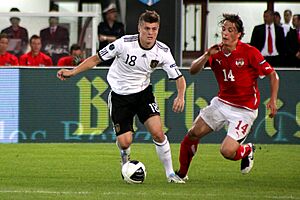
At the Euro 2012 tournament, Kroos played as a substitute in all three of Germany's group matches. For the semi-final against Italy, Löw asked Kroos to mark Italy's key player, Andrea Pirlo. Germany lost the match 2–1, and this decision was criticized.
2014 World Cup Victory
During Germany's 2014 World Cup qualifying campaign, Kroos scored his first two goals in a competitive international game. This was in a 6–1 win over the Republic of Ireland. On September 6, 2013, he scored Germany's second goal in a 3–0 win against Austria.
Kroos was part of Germany's squad for the 2014 FIFA World Cup. In their first game, a 4–0 win over Portugal, Kroos assisted a goal. In the quarter-final, he assisted the only goal against France from a free kick. In the semi-final against host nation Brazil, Kroos scored two goals within two minutes in Germany's amazing 7–1 win. He also made his fourth assist of the tournament. FIFA named him the man of the match. Brazilians nicknamed him Garçom (meaning "waiter" in Portuguese) because he delivered so many perfect passes to his teammates.
On July 11, 2014, Kroos was on the shortlist for FIFA's Golden Ball award, given to the tournament's best player. The official statistics of the World Cup rated Kroos as the best player of the 2014 World Cup. Kroos is considered the only player from the former East Germany to ever win the World Cup.
Later International Career and Retirement
On June 4, 2018, Kroos was included in Germany's squad for the 2018 FIFA World Cup. On June 23, Kroos scored a free-kick goal in stoppage time against Sweden. This gave Germany a 2–1 victory and kept their World Cup hopes alive. However, Germany was knocked out in their next match after losing 2–0 to South Korea.
On October 13, 2020, Kroos played his 100th match for Germany. This was in a 3–3 draw against Switzerland. He was selected for the squad for UEFA Euro 2020. After Germany lost 2–0 to England in the Round of 16 on June 29, 2021, Kroos announced his retirement from international football. He said he wanted to focus on his club career and family.
On February 22, 2024, Kroos announced he would return to the German national team for UEFA Euro 2024, which was held in Germany. He was asked to return by the new manager, Julian Nagelsmann. In March 2024, he assisted a goal just seven seconds into his international return against France. Kroos was part of the German squad for Euro 2024. He helped the team reach the quarter-finals, where they lost to Spain 2–1 after extra time. This was his last career match.
Style of Play
"How Toni distributes the ball, how he receives it, is very good. He's technically excellent ... He has made progress in the last few matches, I'm extremely satisfied with the player."
Kroos is a tall and athletic midfielder who uses his right foot. He is seen as one of the best midfielders of his time. He is known for his long and very accurate passes. He can create goals with his passing and crossing from set-pieces. He has been called a "modern attacking midfielder" who is "dynamic and hardworking." He is also praised for his physical strength and ability to play in different midfield positions.
Kroos often played in the centre as a deep-lying playmaker. He could also play as a defensive midfielder. This was because he could stop opponents' attacks, keep possession of the ball, and create chances for his teammates. Earlier in his career, he played further forward. But as he got older, he played deeper. One of his special moves was taking a quick first touch past an opponent when he received a pass under pressure. This helped him get past players and find space, even though he wasn't very fast. This move was called the "Kroos shuffle." Kroos has many different types of passes. He can control the midfield with short, accurate passes or start attacks with longer passes.
Johan Cruyff, a famous former player, said about Kroos's performance at the 2014 World Cup: "He's doing everything right: the pace in his passes is great and he sees everything. It's nearly perfect."
Personal Life
Kroos married his long-time girlfriend, Jessica Farber, on June 13, 2015. They have two sons and a daughter. He owns a house on the island of Mallorca.
Kroos has spoken out about important social topics. In March 2021, he said it was "wrong" for the 2022 FIFA World Cup to be held in Qatar. He mentioned concerns about how migrant workers were treated. He believed footballers should bring attention to these issues. In 2023, he also shared his thoughts on players moving to the Saudi Pro League, believing it was mainly for money. He said he would not move to that country due to human rights concerns. This led to him being booed when he played in the 2024 Supercopa de España, which was held in Saudi Arabia.
Career Statistics
Club
| Club | Season | League | National cup | Europe | Other | Total | ||||||
|---|---|---|---|---|---|---|---|---|---|---|---|---|
| Division | Apps | Goals | Apps | Goals | Apps | Goals | Apps | Goals | Apps | Goals | ||
| Bayern Munich II | 2007–08 | Regionalliga Süd | 12 | 3 | — | — | — | 12 | 3 | |||
| 2008–09 | 3. Liga | 1 | 1 | — | — | — | 1 | 1 | ||||
| Total | 13 | 4 | — | — | — | 13 | 4 | |||||
| Bayern Munich | 2007–08 | Bundesliga | 12 | 0 | 2 | 0 | 6 | 1 | — | 20 | 1 | |
| 2008–09 | Bundesliga | 7 | 0 | 1 | 1 | 1 | 0 | — | 9 | 1 | ||
| 2010–11 | Bundesliga | 27 | 1 | 3 | 1 | 7 | 1 | — | 37 | 3 | ||
| 2011–12 | Bundesliga | 31 | 4 | 6 | 1 | 14 | 2 | — | 51 | 7 | ||
| 2012–13 | Bundesliga | 24 | 6 | 3 | 0 | 9 | 3 | 1 | 0 | 37 | 9 | |
| 2013–14 | Bundesliga | 29 | 2 | 6 | 1 | 12 | 1 | 4 | 0 | 51 | 4 | |
| Total | 130 | 13 | 21 | 4 | 49 | 8 | 5 | 0 | 205 | 25 | ||
| Bayer Leverkusen (loan) | 2008–09 | Bundesliga | 10 | 1 | 3 | 0 | — | — | 13 | 1 | ||
| 2009–10 | Bundesliga | 33 | 9 | 2 | 0 | — | — | 35 | 9 | |||
| Total | 43 | 10 | 5 | 0 | — | — | 48 | 10 | ||||
| Real Madrid | 2014–15 | La Liga | 36 | 2 | 2 | 0 | 12 | 0 | 5 | 0 | 55 | 2 |
| 2015–16 | La Liga | 32 | 1 | 0 | 0 | 12 | 0 | — | 44 | 1 | ||
| 2016–17 | La Liga | 29 | 3 | 5 | 0 | 12 | 1 | 2 | 0 | 48 | 4 | |
| 2017–18 | La Liga | 27 | 5 | 0 | 0 | 12 | 0 | 4 | 0 | 43 | 5 | |
| 2018–19 | La Liga | 28 | 0 | 4 | 0 | 8 | 1 | 3 | 0 | 43 | 1 | |
| 2019–20 | La Liga | 35 | 4 | 2 | 0 | 6 | 1 | 2 | 1 | 45 | 6 | |
| 2020–21 | La Liga | 28 | 3 | 1 | 0 | 12 | 0 | 1 | 0 | 42 | 3 | |
| 2021–22 | La Liga | 28 | 1 | 3 | 0 | 12 | 2 | 2 | 0 | 45 | 3 | |
| 2022–23 | La Liga | 30 | 2 | 5 | 0 | 12 | 0 | 5 | 0 | 52 | 2 | |
| 2023–24 | La Liga | 33 | 1 | 1 | 0 | 12 | 0 | 2 | 0 | 48 | 1 | |
| Total | 306 | 22 | 23 | 0 | 110 | 5 | 26 | 1 | 465 | 28 | ||
| Career total | 492 | 49 | 49 | 4 | 159 | 13 | 31 | 1 | 731 | 67 | ||
International
| National team | Year | Apps | Goals |
|---|---|---|---|
| Germany | |||
| 2010 | 13 | 0 | |
| 2011 | 11 | 2 | |
| 2012 | 10 | 2 | |
| 2013 | 7 | 1 | |
| 2014 | 16 | 4 | |
| 2015 | 5 | 0 | |
| 2016 | 12 | 3 | |
| 2017 | 6 | 0 | |
| 2018 | 11 | 2 | |
| 2019 | 5 | 3 | |
| 2020 | 5 | 0 | |
| 2021 | 5 | 0 | |
| 2022 | 0 | 0 | |
| 2023 | 0 | 0 | |
| 2024 | 8 | 0 | |
| Total | 114 | 17 | |
- Scores and results list Germany's goal tally first
| No. | Date | Venue | Opponent | Score | Result | Competition |
|---|---|---|---|---|---|---|
| 1 | 6 September 2011 | Stadion Gdańsk, Gdańsk, Poland | 1–1 | 2–2 | Friendly | |
| 2 | 11 November 2011 | Olimpiyskiy National Sports Complex, Kyiv, Ukraine | 1–2 | 3–3 | Friendly | |
| 3 | 12 October 2012 | Aviva Stadium, Dublin, Ireland | 5–0 | 6–1 | 2014 FIFA World Cup qualification | |
| 4 | 6–0 | |||||
| 5 | 6 September 2013 | Allianz Arena, Munich, Germany | 2–0 | 3–0 | 2014 FIFA World Cup qualification | |
| 6 | 8 July 2014 | Mineirão, Belo Horizonte, Brazil | 3–0 | 7–1 | 2014 FIFA World Cup | |
| 7 | 4–0 | |||||
| 8 | 14 October 2014 | Arena AufSchalke, Gelsenkirchen, Germany | 1–0 | 1–1 | UEFA Euro 2016 qualification | |
| 9 | 18 November 2014 | Balaídos, Vigo, Spain | 1–0 | 1–0 | Friendly | |
| 10 | 26 March 2016 | Olympiastadion, Berlin, Germany | 1–0 | 2–3 | Friendly | |
| 11 | 29 March 2016 | Allianz Arena, Munich, Germany | 1–0 | 4–1 | Friendly | |
| 12 | 8 October 2016 | Volksparkstadion, Hamburg, Germany | 2–0 | 3–0 | 2018 FIFA World Cup qualification | |
| 13 | 23 June 2018 | Fisht Olympic Stadium, Sochi, Russia | 2–1 | 2–1 | 2018 FIFA World Cup | |
| 14 | 16 October 2018 | Stade de France, Saint-Denis, France | 1–0 | 1–2 | 2018–19 UEFA Nations League A | |
| 15 | 6 September 2019 | Volksparkstadion, Hamburg, Germany | 2–2 | 2–4 | UEFA Euro 2020 qualification | |
| 16 | 16 November 2019 | Borussia-Park, Mönchengladbach, Germany | 3–0 | 4–0 | UEFA Euro 2020 qualification | |
| 17 | 4–0 |
Honours and Awards
Bayern Munich
- Bundesliga: 2007–08, 2012–13, 2013–14
- DFB-Pokal: 2007–08, 2012–13, 2013–14
- DFL-Supercup: 2012
- UEFA Champions League: 2012–13
- UEFA Super Cup: 2013
- FIFA Club World Cup: 2013
Real Madrid
- La Liga: 2016–17, 2019–20, 2021–22, 2023–24
- Copa del Rey: 2022–23
- Supercopa de España: 2017, 2020, 2022, 2024
- UEFA Champions League: 2015–16, 2016–17, 2017–18, 2021–22, 2023–24
- UEFA Super Cup: 2014, 2017, 2022
- FIFA Club World Cup: 2014, 2016, 2017, 2018, 2022
Germany
- FIFA World Cup: 2014
Individual Awards
- UEFA European Under-17 Championship Golden Player: 2006
- UEFA European Under-17 Championship top scorer: 2007
- FIFA U-17 World Cup Golden Ball: 2007
- FIFA U-17 World Cup Bronze Shoe: 2007
- Fritz-Walter-Medal U18 Gold Medal: 2008
- kicker Bundesliga Team of the Season: 2009–10, 2011–12
- UEFA Champions League Squad of the Season: 2013–14, 2014–15, 2015–16, 2016–17, 2017–18
- FIFA FIFPRO World 11: 2014, 2016, 2017, 2024
- UEFA Team of the Year: 2014, 2016, 2017
- IFFHS World's Best Playmaker: 2014
- IFFHS Men's World Team: 2017, 2024
- IFFHS Men's UEFA Team: 2024
- FIFA World Cup All-Star Team: 2014
- FIFA World Cup Dream Team: 2014
- Silbernes Lorbeerblatt: 2014
- German Player of the Year: 2014
- UEFA European Championship Team of the Tournament: 2016
- La Liga top assist provider: 2016–17
- UEFA La Liga Team of the Season: 2016–17, 2019–20
- IFFHS World Team of the Decade 2011–2020
- IFFHS UEFA Team of the Decade 2011–2020
- German Footballer of the Year: 2018, 2024
- GQ German Athlete of the Year: 2019
- Golden Player Man Award: 2024
- The Best FIFA Men's 11: 2024
See also
 In Spanish: Toni Kroos para niños
In Spanish: Toni Kroos para niños
- List of footballers with 100 or more UEFA Champions League appearances
- List of men's footballers with 100 or more international caps


